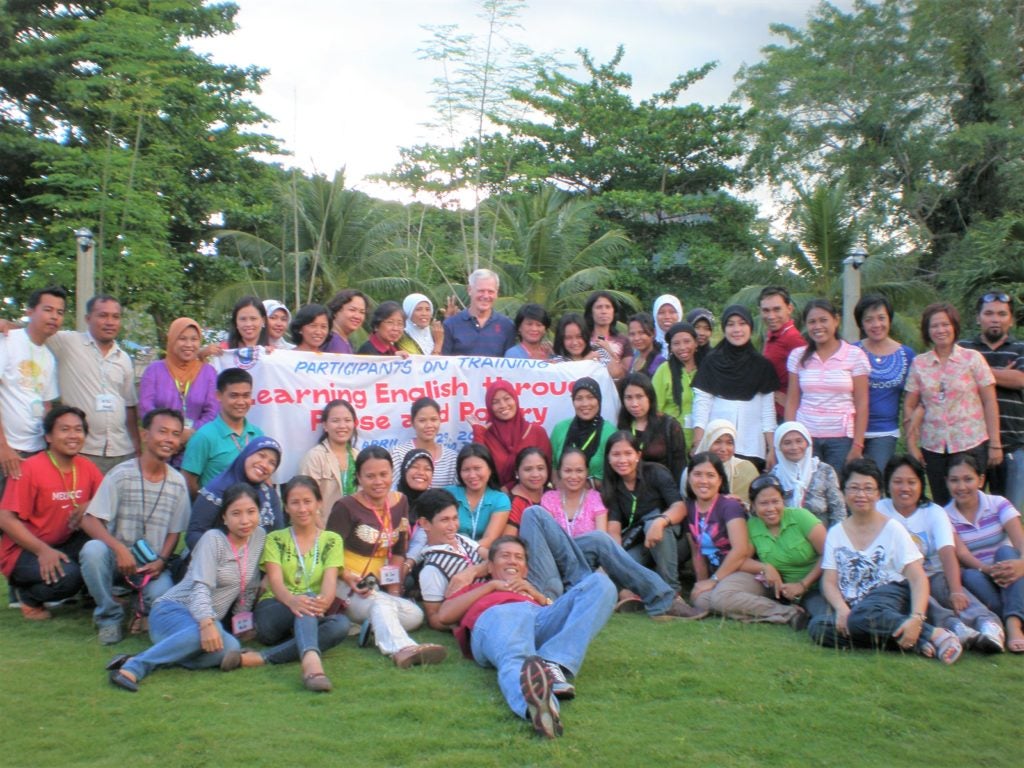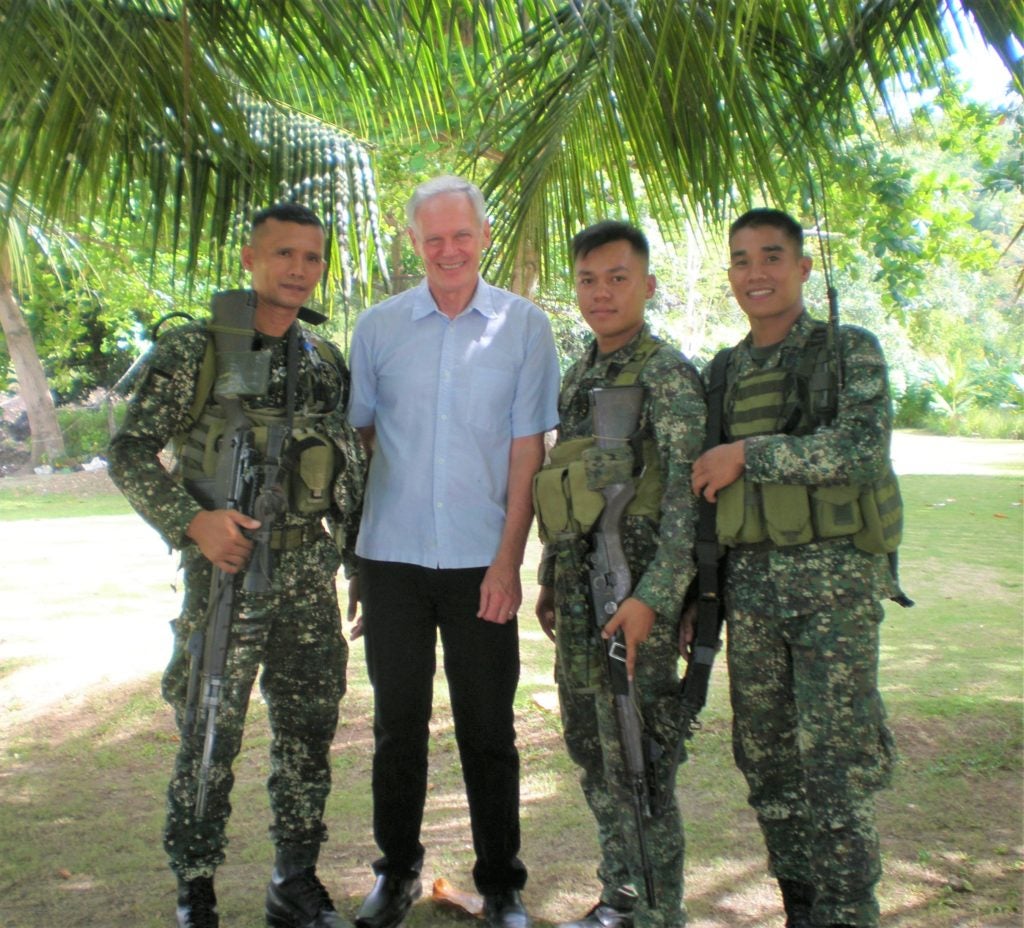“Our two countries have such a strong relationship, and I made connections there – colleagues and friends – that I still maintain today.”
Thomas Kral knows the Philippines well. His first long-term tenure there began in 1984, spending four years in Manila as Regional English Language Officer for the U.S. Information Service. He returned in 2001 for a posting as the U.S. Department of State’s Cultural Affairs Officer, and, following his retirement from the State Department in 2004, he remained an additional three years as Senior Education Advisor in the Philippines for the U.S. Agency for International Development. In all, Kral has lived and worked in the Philippines for 10 years, almost a third of his U.S. government career. “It was always a joy to be there,” he reflects. “Our two countries have such a strong relationship, and I made connections there – colleagues and friends – that I still maintain today.” No wonder that when asked to return to the Philippines as an English Language Specialist in 2010, Kral jumped at the opportunity.
The impetus for the assignment was the 50th anniversary conference of the Philippine Association for Language Teaching (PALT), an organization with which Kral had a long, productive relationship. Not surprisingly, PALT asked him to give the keynote address at the event, which became an unofficial reunion for Kral. He also presented a conference workshop on communicative language teaching (CLT) – an approach that Kral had long advocated for in the Philippines – as well as additional English language teacher trainings, one for high school and secondary teachers held at the University of Santo Tomas, and another for instructors at the Philippine Military Academy, the country’s equivalent to West Point. During these trainings. Kral was gratified to see that the Philippine Department of Education had maintained its concerted effort to upgrade English language teaching in public schools, particularly at the high school and secondary levels, where English plays an equal role to the national language, Filipino, in course instruction.

As much of a whirlwind as the first week was, the project’s second week proved even more intensive. Kral flew to the country’s southernmost island group, Mindanao, where he led a workshop for elementary and secondary school teachers in the Autonomous Region of Muslim Mindanao (ARMM), an independent zone consisting of five predominately Muslim provinces. Filipino Muslims comprise 24% of that island group’s population, and more than half of those reside in the ARMM, which in recent years has been the site of numerous extremist-led conflicts. Even though the training took place at Lake Sebu, a designated safe zone within the ARMM, it was outside the security parameters of the U.S. Embassy, so Kral had to be escorted to the region daily from a city about an hour and a half away, and then back again at day’s end. However, Kral never felt threatened during his time there – he trusted the safe zone guidelines would be respected, plus Filipino armed officers were always nearby. “I felt very secure. There was always an officer in the back of the room, and two outside on the grounds. In fact, one of the best compliments I received during the training was from one of the officers who said, ‘I really like your classes!’” says Kral.
“I wanted to show the teachers how to teach English not as a dry academic subject, but as a language their students could access immediately and enjoy learning.”
No wonder the officer enjoyed them – Kral focused this CLT training on teaching interactive activities that use poetry and songs. “I wanted to show the teachers how to teach English not as a dry academic subject, but as a language their students could access immediately and enjoy learning.” He chose poems that reflected a more diverse America – the works of Maya Angelou, Sonia Sanchez, and Gwendolyn Brooks, for example. The Filipino teachers related to the themes, comparing them to the works of their country’s poets. And they welcomed the opportunity to bring singing – “so deeply embedded in Filipino culture,” notes Kral –into the classroom, from jazz chants to easily learnable American tunes.

Kral considers the ARMM, where security and resulting funding issues have caused English language education to falter, a perfect example of how the Specialist program can bring great benefits to an area “where the need is more pronounced.” He says, “Giving teachers the opportunity to connect with an American colleague, working with teachers who are training future generations, and broadening their acquaintance with the education profession and the world at large brings immeasurable value.”
His commitment to that purpose is so strong that Kral returned to the ARMM the following year to conduct a four-day training, this one focused on teaching English language skills for employment purposes. Because the site of that program was a location where he had to stay overnight – again, outside the Embassy’s security boundaries – Kral was sponsored independently by a Philippine-based non-government organization. “This is an illustration of how the Specialist program can act as a catalyst for local educational organizations to take on funding responsibilities themselves, utilizing Specialists they’ve been introduced to through the State Department.”

Beginning his career in TESOL as a Peace Corps Volunteer in Turkey, Thomas Kral later obtained a doctorate in International Education with an emphasis on Applied Linguistics from the University of Illinois. He taught English in Iran, Australia, and Thailand before joining the United States Foreign Service as an English Language Officer. In this capacity, he served in Afghanistan, Philippines, Russia, Thailand, and Turkey. He was Editor-in-Chief of English Teaching Forum; and as Materials Development Head of the English Language Programs Office, he produced several publications for classroom use overseas. Upon retirement from the federal government, he participated in the English Language Specialist program on assignments to Afghanistan, China, Libya, Philippines, Samoa, and Tunisia.
